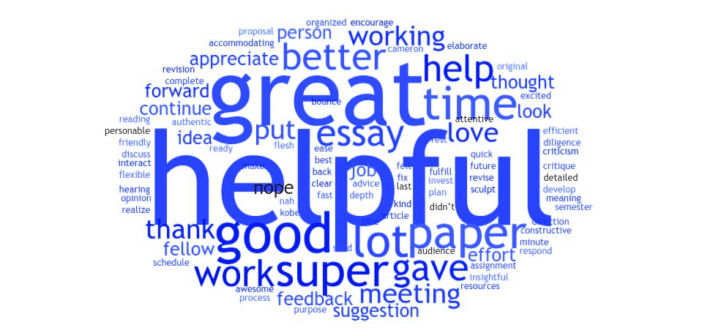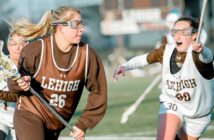The TRAC Writing Fellows Program will transition from giving mid-semester and end-of-semester feedback surveys to implementing a student feedback survey after each meeting with a TRAC fellow to improve the learning experience.
The peer-to-peer mentoring program has accepted fellows to assist students with writing assignments for the past 12 years. While the program has always valued feedback, the fellows said they were unsatisfied by the frequency of the surveys.
“I think, overtime, we had the desire to get regular, immediate feedback so we could adjust and improve on a daily basis instead of a semester basis,” said Gregory Skutches, director of the TRAC program.
Skutches said he credits Timothy LaRowe, ’19, for launching the new addition to the program last year.
Last spring, TRAC collected data from 837 survey respondents. On a scale from zero to 10, every fellow averaged above an overall score of 8.5 for five questions about their abilities and effectiveness.
Jessica Fitter, ’20, a member of the leadership team, said the fellows have always worked hard to make improvements with the program.
“Obviously, we are helping students through the writing and editing process,” Fitter said. “Throughout the years of TRAC, we realized we need to put our money where our mouth is, and we need to continue to improve in our own work, so we have implemented that over time.”
Skutches said Kevin Mittal, ‘20, has worked to accelerate the implementation of the new feedback plan.
Mittal said he has taken responsibility for updating this survey by improving its accessibility and adding features like GIFs and memes.
“We want to make it as fun and as easy as possible for the students, so we will keep it fresh and keep updating it,” Mittal said.
Mittal said the new survey is tech-friendly and easy to access. Scanning a barcode on the wall of the Center for Innovation in Teaching and Learning in the basement of E.W. Fairchild-Martindale Library activates the survey. Once the code is scanned, a link appears for the user to access the survey.
“(Mittal) took this and ran with it,” Skutches said. “He comes to the leadership team weekly with new ideas and new improvements, which is very exciting…It’s tremendously gratifying to see students work so effectively.”
Fitter said program members can use the data to determine areas they can work on as individuals and how to improve the experience for students.
The new survey this semester has already boosted response rate by 33 percent, Mittal said. So far, 400 conferences between students and fellows have been documented. The data collected shows the areas of focus for training new fellows, as well as current fellows’ performances throughout the semester.
“I think it will help the TRAC fellows figure out if there are some weeks that they are doing better than others,” Mittal said. “It’s also a good mechanism to see how much work they’re putting into a semester. They get a lot of great feedback and comments. I think it makes them feel good after.”
Skutches said the program is constantly evaluating the progress and working on ways for the group to improve.
He said peer-to-peer learning allows for collaboration between the fellows and the students they’re helping.
“If everybody in the program can agree that we are here to make learning happen in a collaborative process and are able to put that feedback into the process, it helps us walk that talk,” Skutches said.
These implementations are showing signs of success, but they are still in the beginning stages, Skutches said. He said the potential of the new survey motivates the TRAC fellows.
Fitter said the new survey method could have implications across campus.
“I think the macro-goal here is to be the gold standard, as we have always aimed for continuous improvement,” Fitter said. “If it’s helpful for us, why wouldn’t it be helpful for a tutor or a professor? We definitely hope that anything we do that is successful can be mirrored across Lehigh.”






Comment policy
Comments posted to The Brown and White website are reviewed by a moderator before being approved. Incendiary speech or harassing language, including comments targeted at individuals, may be deemed unacceptable and not published. Spam and other soliciting will also be declined.
The Brown and White also reserves the right to not publish entirely anonymous comments.